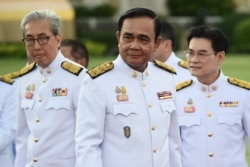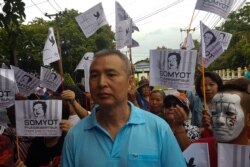Having trounced the military's proxy at the polls in March, Thailand's pro-democracy parties may very well have formed the country's next government by now were it not for the new Constitution the military drafted after seizing power in 2014.
Instead, coup-leader Prayuth Chan-ocha secured a second term as prime minister thanks to a Senate wholly appointed by the junta and empowered for the first time by the new charter to join the popularly elected lower house in voting for the premier.
Now relegated to the opposition, those anti-junta parties have made amending the Constitution their top priority.
"We are talking about restoration of democracy here. Without amending the Constitution, there will be no full restoration to democracy in this country," said Thanathorn Juangroongruangkit, leader of the Future Forward party.
Future Forward finished a strong third in the March 24 poll running on a platform to unseat Prayuth, and afterward it joined forces with six other like-minded parties hoping to pull together enough lower house seats for a majority. But some post-election tweaking of the formula for allotting seats by the junta-appointed Election Commission made sure they fell short. Thanks to the new Constitution, the Senate also ensured that the "Democracy Front" parties lacked the combined majority of votes in both houses to replace Prayuth.
In an interview at his party's headquarters in Bangkok, Thanathorn said the junta's charter was riddled with lines that rig the Senate, Election Commission and other state bodies in favor of the country's urban, monarchist, pro-military elite.
Two articles targeted
The opposition longs to see it replaced wholesale. But knowing their limits, Thanathorn said, the parties are focusing on amending just two articles for now — 272 and 279.
The first gives the appointed Senate the power to join the elected lower house in the vote for premier. The second makes unassailable any order from Prayuth during his first term or from the government the military set up after the coup, the National Council for Peace and Order (NCPO).
"So you can see the move clearly, that the establishment, they are afraid of the voice of the people, they don't want to see the voices of the people heard in the Parliament," Thanathorn said.
Amending only two of 279 articles may sound modest. However, each cuts to the very heart of the military's continued grip on power, and changing either will take the support of at least a third of the junta's handpicked Senate.
Thanathorn said the opposition parties will submit a bill proposing the amendments by the end of September, or by the end of the year at the latest. He knows the odds are stacked against them. But even if they fail, he said, they hope the fight will bruise the ruling parties.
"We know that the chance, the possibility of these two articles be[ing] approved by the Parliament will be extremely low. We understand that full well. But we want to show to the people what organizations, which parties are against this movement," he said.
"So we look at it as a platform, we look at it as a movement, as a campaign rather than the final result ... to get this approved."
Thanathorn said the parties of the Democracy Front have agreed to make the amendments their main objective "in principle," though he added warily that "'How?' is the question."
Public opinion
The Future Forward leader believes their only hope is to harness enough popular outrage to shift the political winds in their favor and convince enough senators to break ranks. Thanathorn said the front will build support online, tour the country to spread its message and — at some point — hit the streets.
"Eventually, if you want to amend the Constitution, if we are going to change it, partly or wholly, there must be rallies," he said.
Somyot Pruksakasemsuk agreed. His grass-roots group, the Social Democrat Movement, is gathering signatures from eligible voters to submit its own amendment proposals. He hopes to have the 50,000 names the group needs to put its plan before Parliament by the end of the year.
"The Constitution came up from the military coup d'état, it [did] not come from the people, it [did] not come from democracy," Somyot said. "So we have to amendment the Constitution so that we can have a government that really comes from the people, not a government that [is] dominated by the military."
Most Thais already may be with them. A recent opinion survey by the National Institute of Development Administration found a slim majority believes the Constitution is undemocratic and supports amending it, Article 272 in particular. But only about a third said it was urgent.
Those pushing for the amendments may even have an ally in the government itself. The Democrat Party, a key member of the ruling coalition, has insisted on getting a pledge to amend the Constitution into the government's coming policy package, though it seems more interested in easing the rules on making amendments than curbing the Senate.
The Democrat Party did not respond to requests for an interview. Palang Pracharath, the heavyweight of the ruling coalition, did not reply to multiple requests either.
Yutthaporn Issarachai, a political scientist at Sukhothai Thammathirat Open University, said he could not imagine the government backing amendments to any articles critical to the establishment's hold on power.
He said the opposition's campaign might dint the government's reputation and cost its parties votes in the next election. He did not expect the military-backed government to brook any major protests, though, muffling the public pressure that might persuade any number of senators to break with their bosses.
"I think the popular vote outside the Parliament cannot convince the senators to vote for editing the Constitution because the senators come from [the] NCPO and they have so [much] unity," he said.







